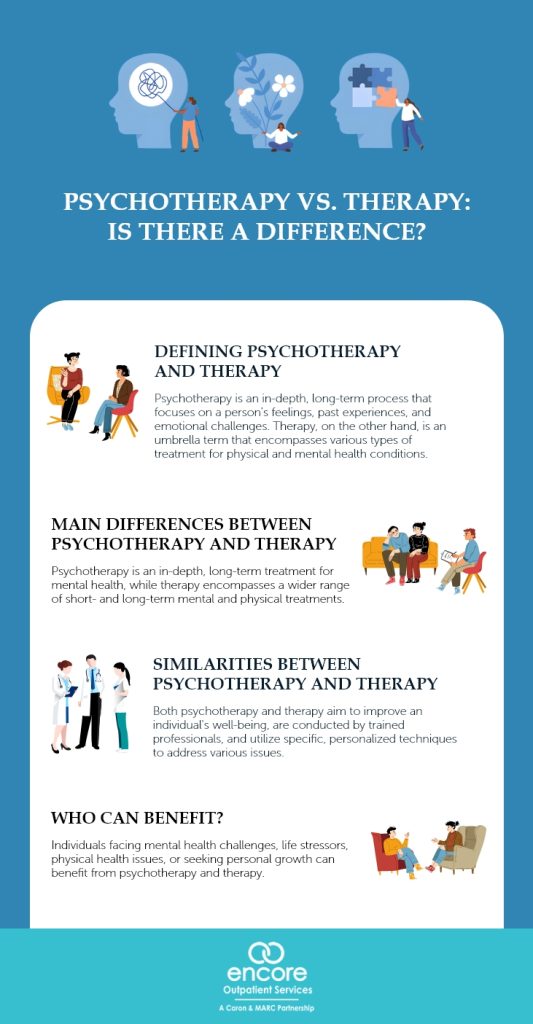Our dedication lies not just in treating symptoms but in addressing the root causes, offering a holistic approach that integrates the best of therapeutic practices with the warmth of community support.
Psychotherapy vs. Therapy: Is There a Difference?

The terms psychotherapy and therapy are often used interchangeably, causing confusion regarding their differences. While both psychotherapy and therapy share the goal of addressing psychological challenges, they differ in terms of theoretical foundations, treatment durations, and the types of challenges addressed. This article aims to unravel these distinctions, providing individuals with a clearer understanding of these therapeutic interventions. A nuanced understanding of the differences between these two interventions can empower individuals to make informed choices in their pursuit of mental and emotional well-being.
Defining Psychotherapy and Therapy
Psychotherapy is an in-depth, long-term process that focuses on a person’s core issues, past experiences, and emotional challenges. It aims to help individuals deal with longstanding and complex issues, leading to personal growth. The process typically involves exploring past experiences, identifying negative thought patterns, and developing coping strategies. It’s conducted by licensed professionals, such as psychologists, psychiatrists, or licensed counselors, who have extensive training in a range of therapeutic approaches.
Therapy, on the other hand, is an umbrella term that encompasses various types of treatment for physical and mental health conditions. For mental health conditions, therapy generally refers to short-term talk therapy, which focuses on helping a person find solutions to current issues. Therapy aims to inspire change, enhance self-awareness, and provide support for individuals, couples, and families facing a variety of challenges.
While both therapeutic approaches can be used to treat mental health conditions, psychotherapy is more focused on long-term or in-depth challenges, while therapy is geared towards short-term or specific present challenges or goals. The choice between the two depends on the individual’s specific needs and goals.
Types of Psychotherapy
Psychotherapy encompasses a variety of approaches, each with its unique methods and focuses:
- Cognitive Behavioral Therapy (CBT) – CBT is a widely used approach that combines cognitive and behavioral techniques. It focuses on changing negative thought patterns and behaviors and addressing issues like anxiety, depression, and stress-related disorders.
- Psychodynamic Therapy – This therapy stems from Freudian psychology. It explores unconscious thoughts and past experiences, aiming to understand and resolve deep-seated emotional conflicts, often linked to early life experiences.
- Humanistic Therapy – Emphasizing personal growth and self-awareness, humanistic therapy focuses on the individual’s capacity for self-fulfillment. It includes approaches like client-centered therapy, stressing empathy, and unconditional positive regard.
- Interpersonal Therapy (IPT) – IPT is short-term and structured, primarily used for treating depression. It focuses on improving interpersonal relationships and communication skills to help resolve symptoms of depression.
- Dialectical Behavior Therapy (DBT) – DBT is a form of CBT that combines standard cognitive-behavioral techniques with concepts of mindfulness, acceptance, and emotion regulation. It is particularly effective for treating personality disorders and chronic suicidal ideation.
- Trauma-Focused Therapies – Therapies like eye movement desensitization and reprocessing (EMDR) target individuals who have experienced trauma. These therapies aim to process and integrate traumatic memories.
- Family and Couples Therapy – These types of therapy address the issues within the context of family and relationships. They aim to improve communication and resolve conflicts within these units.
Each type of psychotherapy has its specific application and can be chosen based on the individual’s needs and the nature of their issues. The effectiveness of these therapies varies depending on the person and their unique circumstances, making the choice of the right type a crucial step in the therapeutic process.

Types of Therapy
Therapy encompasses a broad range of treatments, each addressing different aspects of mental and physical health:
- Counseling – Counseling is a type of therapy that focuses on specific issues, providing guidance and support. It helps individuals manage life changes, relationship problems, and stress-related issues.
- Occupational Therapy – This therapy helps individuals develop, recover, or maintain daily living and work skills. It’s particularly beneficial for those with physical, mental, or developmental conditions.
- Physical Therapy – Physical therapy aims to alleviate pain and improve mobility, function, and overall physical health. It’s often used for rehabilitation after injuries or surgeries and for managing chronic conditions like arthritis.
- Speech Therapy – Speech therapists work with individuals who have speaking and language difficulties. This therapy is essential for conditions like stuttering, language delays, and communication challenges resulting from stroke or injury.
Each type of therapy offers unique benefits and is tailored to address specific needs. The choice of therapy depends on the individual’s condition, goals, and preferences. These therapies can be effective in improving various aspects of an individual’s life, from mental well-being to physical health and cognitive abilities.
Main Differences Between Psychotherapy and Therapy
The primary difference between psychotherapy and therapy revolves around their scope, duration, and objectives.
- Scope and Focus – Psychotherapy is an in-depth process that deeply explores a person’s emotional state, past experiences, and psychological challenges. It’s oriented towards understanding and resolving complex, long-standing mental health disorders and challenges. Therapy, in a broader sense, may include various treatments addressing both mental and physical health, with some forms focusing on immediate, situational problems.
- Duration and Intensity – Psychotherapy typically involves a long-term commitment and is more intensive. Sessions are designed to delve into deep-seated mental health concerns and may continue for months or years. Conversely, therapy can be more flexible, ranging from short-term interventions to longer-term treatments, depending on the type of therapy and the issue at hand.
- Goals and Outcomes – The goal of psychotherapy is often personal growth, healing from past traumas, and deep psychological change. Therapy, particularly when it refers to shorter-term talk therapy, aims to provide immediate coping strategies and solutions to current life challenges.
- Professional Training – Psychotherapists are usually highly trained in specific therapeutic modalities and often require a higher level of certification. Therapists, depending on their specific field (like physical therapy, occupational therapy, etc.), have different training and certification requirements.
Understanding these differences can guide individuals in choosing the most appropriate type of treatment for their needs.
Similarities Between Psychotherapy and Therapy
Despite their differences, both approaches share several key similarities:
- The Objective of Improving Well-Being – Both psychotherapy and therapy are fundamentally aimed at enhancing an individual’s overall well-being. Whether through addressing mental health issues, emotional distress, behavioral challenges, or physical ailments, the primary goal is to improve the quality of life of the person seeking help.
- Involvement of Professional Guidance – Both forms of treatment are conducted by trained professionals. These practitioners are equipped with the necessary skills and knowledge to assist individuals in their journey toward recovery or better mental and physical health.
- Use of Therapeutic Techniques – Psychotherapy and therapy often employ specialized techniques tailored to the individual’s needs. These methods are designed to help individuals understand and work through their challenges, whether they are psychological or physical in nature.
- Confidentiality and Safe Space – Both psychotherapy and therapy provide a confidential and safe environment. This setting is crucial for individuals to feel secure in sharing their thoughts, feelings, and experiences without judgment.
- Focus on Personalized Care – In both psychotherapy and therapy, treatment plans are often personalized. Therapists and psychotherapists work to create a plan that caters to the unique circumstances and needs of each individual.
These shared aspects are fundamental in helping individuals achieve their health and wellness goals.
Who Can Benefit?
Psychotherapy and therapy are beneficial to a wide range of individuals, each addressing specific needs:
- Beneficiaries of Psychotherapy:
- Individuals experiencing chronic psychological disorders like depression, anxiety disorders, personality disorders, mood disorders, post-traumatic stress disorder (PTSD), and obsessive-compulsive disorder (OCD).
- Individuals who are aiming to understand themselves better and improve their emotional well-being.
- Individuals seeking to heal from past emotional traumas or adverse life events.
- Individuals battling substance use disorders, such as alcohol and drug addictions
- Beneficiaries of Therapy:
- Individuals experiencing immediate stressors, such as relationship issues, job stress, or grief.
- Individuals requiring physical therapy for recovery from injuries, surgeries, or managing chronic physical conditions.
- Individuals who are looking to develop specific skills, like communication or coping strategies, through occupational or speech therapy.
Who Provides These Services?
The provision of psychotherapy and therapy services is carried out by a range of qualified mental health professionals, each with specialized training and credentials:
- Psychotherapists – They are trained professionals who provide psychotherapy services to individuals, couples, families, and groups. They have specialized training and credentials in providing mental health services and can offer a range of therapeutic approaches to address different mental health concerns.
- Clinical Psychologists – Clinical psychologists holding a doctoral degree in psychology are trained in the assessment, diagnosis, and treatment of mental disorders. They provide psychotherapy and are skilled in administering psychological tests.
- Psychiatrists – Psychiatrists are medical doctors who specialize in mental health. They can prescribe medication and provide psychotherapy, often for more severe mental health conditions.
- Licensed Professional Counselors – Mental health counselors have training in providing guidance and support, often holding a master’s degree in counseling or a related field. They work with individuals facing life challenges, relationship issues, and stress management.
- Licensed Clinical Social Workers (LCSWs) – These professionals hold a master’s degree in social work and are licensed to provide therapy. They work with individuals, families, and groups to address social and emotional difficulties.
- Licensed Marriage and Family Therapists (MFTs) – These mental health professionals are specialized in treating relationships and family dynamics. They provide marriage counseling or family therapy.
- Psychiatric Nurses – These are registered nurses with specialized training in mental health care. They provide a wide range of services, including assessment, diagnosis, care, and treatment of mental health and substance use disorders.
- Occupational Therapists – These therapists help individuals develop or regain skills essential for daily living and working. They are trained in occupational therapy and often work with people recovering from injuries or with developmental disabilities.
- Physical Therapists – Physical therapists specialize in the physical rehabilitation of patients. They have specific training in physical therapy and are skilled in techniques to improve mobility and relieve pain.
- Speech Therapists – Speech therapists, or speech-language pathologists, are trained to assist with speech and language disorders. They help individuals improve their communication abilities.
Each professional brings a unique set of skills and expertise, making them suited to treat different types of issues. The choice of a professional depends on the individual’s specific needs and the nature of the services required.
Choosing Between Psychotherapy and Therapy
When deciding between psychotherapy and therapy, consider the following factors to determine the most suitable option:
- Nature of the Issue – If you’re dealing with complex, deep-rooted psychological problems or a desire for in-depth personal growth, psychotherapy is often the recommended choice. For addressing specific, current life challenges, situational stress, or physical health concerns, therapy in its various forms (such as counseling or physical therapy) may be more appropriate.
- Duration and Commitment – Psychotherapy typically requires a longer-term commitment and is suited for those willing to invest time in exploring and resolving long-standing issues. Therapy, especially in forms like short-term counseling, can be a better fit for those seeking brief intervention for immediate concerns.
- Professional Expertise – Consider the qualifications and expertise of the professional. Psychotherapists are specialized in mental health treatments, whereas therapists may have a broader or different specialization.
- Personal Goals and Preferences – Reflect on personal goals, whether they align more with the in-depth exploration offered by psychotherapy or the more targeted approach of therapy.
- Recommendations from Healthcare Providers – If you are uncertain about which type is more appropriate, consider consulting with a healthcare provider who can guide you based on your specific needs.
In making this decision, it’s important to weigh these factors carefully. Both psychotherapy and therapy have their unique strengths, and the choice largely depends on the individual’s specific issues, goals, and preferences. A thoughtful consideration of these aspects will aid in selecting the most effective path toward personal well-being.
If you or a loved one is navigating the complexities of substance use disorder and/or co-occurring disorders, Encore Outpatient Services is here to offer a supportive path forward. Encore offers individualized psychotherapy by highly qualified clinicians. Our therapists have extensive experience assisting patients with a wide range of challenges, including substance misuse, trauma, loss, attachment, anxiety, depression, and suicide or thoughts of self-harm. At Encore, we are committed to providing compassionate, expert care to help you on your journey to recovery and wellness. We encourage you to reach out to us for support and take the first step towards healing and empowerment.
Let Us Support You On Your Recovery Journey!
Copyright 2026 Encore Outpatient Services | All Rights Reserved



